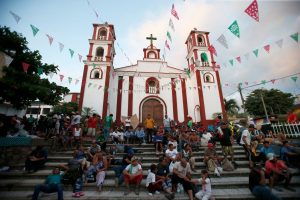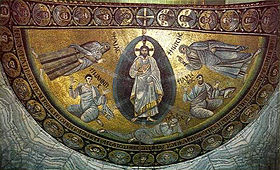
(Rebecca Blackwell/AP)
Strange but true: the OED has no word for the irrational fear of poor people. Perhaps we have assumed that fear of poor people is more rational than fear of spiders (arachnophobia) or mushrooms (mycophobia) or the number thirteen (triskaidekaphobia).
More than ten years ago, I published a book called The Fear of Beggars. It argued that fear of poor people, particularly the ones who do not endure their lot quietly at home but publicly ask for help, is more important than we’ve realized to our economic thinking. That fear influenced both modern economic thought and shaped Christian talk about “stewardship,” both of which claim that responsible ownership, not redistribution of property, is the way to deal with poverty. And poor people who want change should wait (gratefully) for owners to bring that change about.
I did not think much about migration at that time. I did not imagine a caravan of migrants walking from violence and life-damaging poverty toward the US. I would have thought it hyperbolic fantasy to think the US would respond to such a move by deploying the military at the border. I didn’t understand the reach of vicious misinformation. It never occurred to me that in the US an anti-Semitic nationalist would kill Jews at prayer because they were, as Jews, associated with an organization that resettles refugees.
I had, in truth, no idea how hot the fear of beggars runs.
What is the Christian answer to this fear? It starts with something that has “the fragrance of the gospel” (Evangelii Gaudium, 39), something like this:
Outside her family’s hardware store, Coqui Cortez, 57, had set up a table to feed migrants lemon tea and stew, using meat from her son’s butcher shop. Down the street, her daughter was handing out fruit.
“My family has been very blessed,” Cortez said. “And we know that we are all brothers. What God gives us, we should share.
“But we do it with a lot of love,” she added.
For towns such as Pijijiapan, not far from Mexico’s border with Guatemala, migration is second nature. For decades, people have hiked the back roads and ridden trains heading north. Many here say they have relatives in the United States or have migrated themselves. Central American migration to southern Mexico has caused tensions in recent years, as numbers have grown, but people here understand the poverty and violence that migrants are fleeing.
“Today it’s them. Tomorrow it could be us,” said Lesbia Cinco Ley, 70, who was volunteering with the Catholic church in town to distribute food.
True, the caravan was passing through, not settling. But this town, Pijijiapan in Chipas, has a population of about 50,000 and plenty of its own poverty. What they had, they shared, because rather than seeing an assault, they saw their kin.
I can imagine my students’ eyes rolling at this point. They know the right answer: Christian thought on property always comes back to this business about sharing the goods of the earth to meet everyone’s needs. The problem is not that people don’t know that’s the Christian answer. The problem is that many of us do not feel it is the right answer. Fear and cynicism have made welcoming those who are poor seem irrational, sentimental, soft, and perhaps “feminine.”
The universal destination of goods has to be a matter of habit. Many studies have demonstrated that those who are (or think they are) wealthy are less empathetic to people in need. Lately that result has been revised a bit: a new study indicates that those in a low inequality situation are more likely to help and those in high inequality situation are less likely. That is, we aren’t more likely to disregard others’ needs because we are wealthy; we are more likely to disregard others’ needs if our context involves a high degree of inequality.
This is a very suggestive finding: it may mean that Pope Francis is right to emphasize encounter as a key practice. Discovering that we are family changes our sad old moralism about needing to share into the experience of kinship and affection.
The truth is, it is hard to honor the universal destination of goods when you haven’t had practice of giving and receiving in time of need; when so much around you tells you that you deserve more and matter more than others; when so little causes you to know you are connected to others. The renewal of Christian life in our age, in our parishes and other communities, will have to make encounters of kinship into key formative practices of the faith, as a sacramental moment that heals our fear of each others’ needs.




